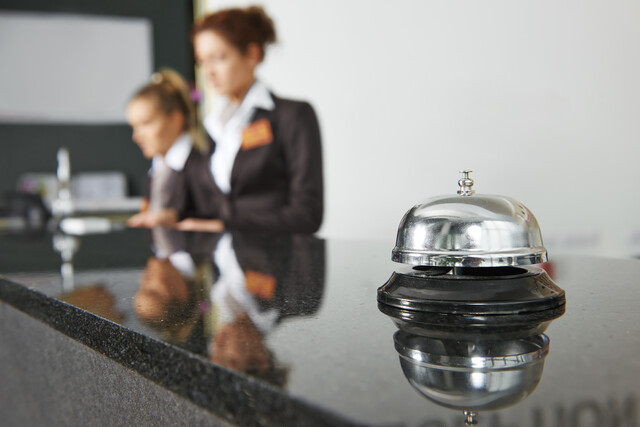Whether you decide to become a travel agent and work in a traditional brick-and-mortar travel agency or start your own home-based business, you're going to need to start with the basics.That includes a business plan, establishing a business name, organizing your business and obtaining proper licensing, and deciding what services you're going to offer clients. Opening your own travel business doesn't stop there; you'll also need to set up your office, establish bank accounts, and position your business for growth and development.
|
The first thing you want to do if you decide to start a home-based travel business, is to sit down and think it through from start to finish. That doesn't mean you need to know every detail that will eventually go into the growth and development of your business, but it does mean sitting down and obtaining advice, performing research, and understanding the basics of licensing requirements for a home-based travel business.
If you are completely new to the business world, it is strongly suggested that you do spend a bit of money and contact an attorney who can offer legal advice regarding the structure of your business. You may also wish to temporarily engage a certified public accountant for advice on the financial side of starting up your business.
|
|
The next thing you need to do is establish a name for your business. Your local County Recorder's office will be able to help you do this. You'll need a fictitious business name statement, also known as a DBA (doing business as). While many independent contractors who work from home utilize DBA information for 1099 and W-2 forms, you will need a business name if you decide to incorporate, form a limited liability company, or go into business with someone else.
Your business name should reflect the nature of your business. Don't try to get too fancy or creative, but don't be generic either. Try to summarize the focus of your business in as few words as possible to enhance advertising and promotion efforts. For example, you might choose names like South American Destinations, Jessica's Pacific Rim Cruises, or South African Safaris. Choosing a short and concise name for your business will also enhance your efforts when you develop your website (a must) as well as a domain name for your website.
| Going It Alone or Forming a Partnership |
You may decide to establish your travel agent business as a sole proprietorship, which is very easy, while partnerships require a little more effort and documentation. In some cases, home-based travel agents and agencies decide to operate as corporations that enhance protection for owners, because clients generally aren't able to sue shareholders of a corporation. Operating a Limited Liability Company (LLC) is another way to protect yourself in the event of suits or litigations brought against you by a client. Again, it is suggested that you obtain advice from a legal professional regarding structure of your operation, as well as liabilities and tax issues.
Do not go into business (home-based or otherwise) without obtaining the proper licensing when required! However, licensing for travel agents isn't required in many states, or even on the federal level. But do check with your local city or county authorities to determine if you need a local business license in order to operate a travel agent business from your home.
Be advised that some states require travel agents, travel promoters, or anyone advertising travel to the public, to register their business with the state attorney general's office. Because these requirements vary from state to state, check with your state government resources regarding registration, bonding, or other paperwork that will be required to meet such requirements.
This information may also be obtained from your local NACTA chapter, or click onto their website at www.NACTA.com to view registration requirements and laws that govern travel agents in your state.
Running a travel agent business from home can save you a lot of money, but it also requires some basic equipment, supplies, and an office where you can meet with clients. A home office can be located anywhere in a home or on a piece of property, such as the garage, an attic, an extra bedroom or even your kitchen table. However, keep in mind that if you do operate a home business and a client wishes a face-to-face meeting to discuss travel arrangements or plans, the area you choose should appear as professional and efficient as possible.
At the very minimum, you're going to need a desk, a comfortable chair, a computer (whether it's a desktop or a laptop), a fax machine, and a dedicated telephone line utilized only by your business and not by the rest of your family.
No matter where you decide to locate your home office, it should be used exclusively for business reasons. Try to limit interruptions by family, friends, and neighbors. There is nothing quite so embarrassing for many home-based business owners as to be discussing information with a client only to hear a dog barking in the background, a baby crying, or your husband hollering, "Where's the dish soap?" on top of television noise or music.
Remember that no matter what services you provide, your business is a serious effort and should be treated as such by everyone in the household. You're not going to get many clients, or encourage their trust, if they don't think that you're professional, organized, or efficient.
As a travel agent, you may need more than one telephone line. Newer homes are often designed and wired with pairs of telephone lines that can accommodate resident's lines, a business line, as well as 800 numbers on top of the local business line. A toll-free business line will offer your clients toll-free service, which is a definite perk. In addition, you're going to need another line to dial in to the Computerized Reservation Database or various websites while at the same time being able to fax or e-mail while you run checks or engage in conversations on a business phone line. Contact your local phone company for help in designing an arrangement that will suit your purposes and needs.
| Office Furniture, Filing, and Storage |
While you can make do with just about anything to serve as a desk, including plywood, a card table, or your mother's antique oak desk the size of the bed, you're definitely going to have to be a little more choosy with your chair. Your desk chair is going to be your home away from home for eight or 10 hours a day (or more). It's got to be comfortable, and if possible, ergonomically designed to reduce back stress, leg discomfort, as well as neck and shoulder discomfort or misalignment.
In addition, you want to avoid clutter to maintain organization and efficiency, so invest in file cabinets or storage boxes that can be easily labeled and accessed. You're going to have to do a lot of research for your travel business, and you may wish to have a separate file cabinet that contains destination information, and another for airlines, cruises, accommodations, and so forth.
Organize your office space for maximum efficiency, not looks. Try to keep most of your equipment and phones within arm's reach of your desk chair. Keep your client files organized and up to date, and keep track of all earnings and expenses for income tax time.
While you may start off small, always prepare for the growth and development of your business. In most cases, it generally takes between one and two years to establish a home-based business and maintain a regular and consistent clientèle. Don't let your home office space limitations place limits on the growth and development of your business. You may have to move out of the walk-in closet and into a bedroom, or out of the kitchen and into a bedroom that has been made over into a home office. If you're very successful, you may even consider leasing office space in your local town.
Regardless, give yourself and your business the time and opportunity to grow one step at a time. Before you start generating marketing and promotion to obtain your first client, make sure that you have all the necessary ingredients and equipment and software to make that first sale.
Familiarize yourself with the travel industry, the basics of business plans and organization, and ensure that you have the minimum equipment to offer potential clients what they need or desire in your specialty or niche.
Financial Matters
You may be excited and go gung-ho with the development of your new travel agent business, keeping busy researching destinations, services, and opportunities you can provide to clients, but don't forget to take enough time to understand small business know-how. Small business management basics include banking, tax obligations, and the importance of keeping extremely precise, detailed, and accurate records regarding all aspects of your business. This lesson will focus on helping you set up the books for your new travel agent business and familiarize you with revenue and expense accounts, accounting systems, and record keeping.
As a travel agent, whether you work at an established business location or you're starting your own home-based business, you're going to need to develop an accounting system, keep track of profit and loss statements, expenses and revenue, and other types of records.
Many independent contractors starting a home-based travel agent business decide to use the services of a public accountant for their first year of business to ensure that accurate and knowledgeable bookkeeping will help keep your growing business on track. You can determine the type of accounts you may need, depending on the type of services you offer clients.
For example, main revenue accounts may include:
For example, air sales are reported separately from any other type of sale. Some travel agents separate domestic air sales from international air sales, or cash sales from credit card sales. Cruises and organized tours are generally prepaid via cash, credit card, check, or a combination. Convention sales, tour product sales, and group sales are often itemized individually.
Here are some additional points to remember:
-
As a travel agent, you're also going to run into canceled trips and are required to offer refunds or refund credits. It is essential that you understand how such refunds and cancellations are noted in your books.
-
All commissions, for any service, should be reported as net amounts and not as the cost of sale or a gross sale. Doing so inflates the agency's sales volume, which will not be supported by adequate documentation come tax time.
-
Advertising income for the creation of flyers, brochures, magazine or other media ads should be listed as a separate income, as is banner advertising and affiliate revenues from your website.
Many travel agents also collect service fees, which should be separated from other fees on income statements. This enables the travel agent to determine an average yield per client transaction, most often utilized for domestic airline ticketing. In addition, any fees or income that you earn through seminars, consultations, or other services should be listed on an income statement. Travel school tuition and other education expenses should be separated into an independent category, as well.
What exactly is interest income? Interest income is defined as any monies earned from checking accounts, money market funds, or any other accounts an agency holds that generate interest, or "other income."
As a travel agent, you're also going to have expenses. Some examples of expenses may include:
-
Professional fees
-
Advertising
-
Marketing and promotion costs
-
Commissions
-
Education
-
Communications costs
-
Familiarization tours
-
Insurance
-
Licensing and certification fees
-
Printing, postage, and other supplies
-
Travel expenses
-
Website development, maintenance, and hosting fees
Of course, there are many more expenses that you may have in the development and maintenance of your business. Keep track of every expense, no matter how small. Keep track of mileage and automobile expenses for business travel. All your expenses, or a majority of them, will be deductible on your yearly income taxes, including membership dues, education costs, reference materials including the cost of books, travel magazines, and so forth. Meeting clients for dinner or somewhere else to discuss family vacations can also be written off, as can familiarization tours and cruises, a legitimate business expense for travel agents. However, before engaging in cruises or other types of travel for such research, double check with your CPA to ensure that you are prepared to offer the adequate documentation necessary to support the legitimacy of such write-offs for the IRS.
Expenses generated for website development, maintenance, and hosting can also be written off, as can software for your computer that provides any service for your business, including accounting.
Make sure you understand all the financial aspects of running your business. Click on the website of the Small Business Administration at
www.sba.gov/ and take the time to read and research the resources available there, not only to identify tax obligations, but multiple aspects of small business know-how that will help you better run your business.
From setting up a separate bank account for your business, to learning how to accurately keep track of income and expenses, access the print and online resources to make your business run smoothly and efficiently. Don't leave anything to chance. Other websites, such aswww.entrepreneur.com, is also an excellent resource for small businesses and home-based business owners.
If you operate a home-based business, you're also going to have to consider such things as medical or health coverage, small business or home office insurance, and perhaps even E&O (Errors and Omissions) Insurance to help protect you and your business.
Understand the difference between a Limited Liability Company, Sole Proprietorship, or a Corporation to enhance your appearance of professionalism. Learn about the benefits and drawbacks of each of these types of business structures, and determine which would best meet your needs.
Obtain a Federal Taxpayer Identification number instead of using your Social Security number to enhance your credibility and professionalism. In addition, using a Federal Taxpayer ID number will enable you to separate your personal income from your business income. You can obtain a Federal Taxpayer ID Number by contacting the IRS and asking that one to be assigned to you.
In addition, protect your finances, as well as your reputation, by setting up your business bank account as a "Trust Account." This account, often known as a "Client Trust Account," can be used for deposit of client's funds that can either then serve as pending deposits or payments to suppliers or your host agency. Once all final payments have been made, you are then able to transfer your commission to your own "Operating Account". This not only protects you, but your clients in the event of cancellations, refunds, or disputes. That being said, you should always create a separate checking account and checkbook for your business. It is strongly advised that travel agents never use personal checking accounts for business finances or situations.
As you can see, there are many financial considerations to understand in the day-to-day operation and maintenance of your travel agent business. Again, take the time to carefully research your financial obligations prior to opening your doors for business in order to generate a sense of confidence and efficiency -- not only for your clients, but also for yourself. Regardless of where you work, your success as a travel agent is going to depend on your ability to organize and maintain adequate records, and generate clients. Our next lesson will focus on marketing and promotion for your new travel agent business.

























